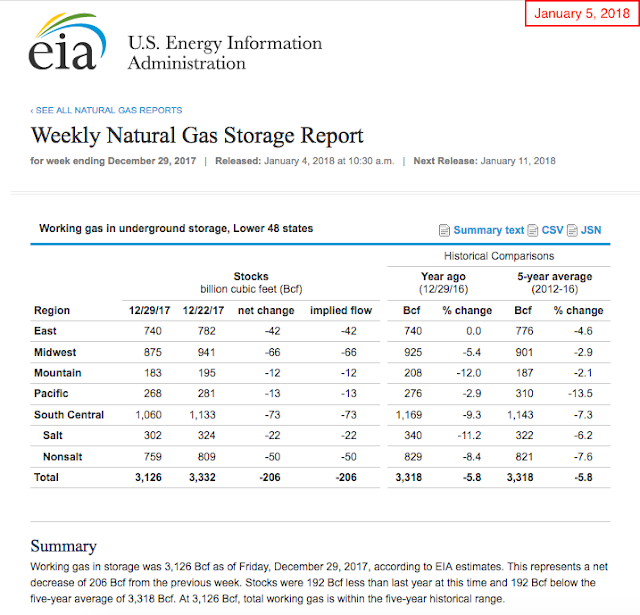Updates
January 6, 2018: as a reader suspected -- dual-fuel units are switching to oil, burning through emissions limits. A huge "thank you" to another reader for spotting this.
New Yorkers and New Englanders are cranking up their thermostats to stay warm amid an extreme cold snap, but New England's grid overseer and its generators are finding that dual fuel generators are burning through not only needed wintertime oil supplies but also emissions allowances for the rest of the year.January 6, 2018: by the way, a reader clicked on "renewables" over at ISO New England to discover that renewables are:
ISO New England spokesperson Marcia Blomberg said the regional power system is operating under normal conditions but the extreme cold weather is increasing demand for natural gas for heating, creating pipeline constraints, driving up natural gas prices and causing dual-fuel generators to switch fuels. As a consequence, oil- and coal-fired power plants are generating much more power than usual and wholesale power prices have soared, said Blomberg.
As of 10:30 a.m. on Jan. 2, 34% of New England's electricity was being supplied by oil-fired generation (which over a given year supplies less than 1% of the region's generation), followed by natural gas at 25%, nuclear at 23%, renewables at 9%, coal at 6% and hydro at 4%. Of the renewable generation, 62% of it was supplied by greenhouse gas-emitting wood-, refuse- and landfill gas-fired generation, with wind supplying 38% and solar less than 1%. According to data from SNL Energy, ISO-NE's internal hub clocked a day-ahead power price of $210/MWh at peak on Jan. 2, up from a Dec. 22 peak of just $66.25/MWh.
n neighboring New York, which also faces wintertime gas capacity constraints, grid overseer New York ISO said the state has sufficient generation capacity and reserves to meet Jan. 2's projected peak demand of 24,500 MW, with some dual fuel units switching to oil as a result of increased demand for natural gas and both higher gas and wholesale electricity prices. According to the NYISO, dual fuel resources supplied nearly 30% of the state's generation at 12:15 p.m. on Jan. 2, followed by nuclear at roughly 28%, hydro at almost 15% and natural gas at approximately 14%.
New York's Hudson Valley saw power prices skyrocket to $205.50/MWh for Jan. 2 day-ahead markets compared with just $35/MWh on Dec. 22, while New York City area day-ahead prices increased to $215.25/MWh compared with $35/MWh on Dec. 22, and Western New York day-ahead prices soared to $195/MWh from $29.75/MWh on Dec. 22.
- wind: 50%
- wood, garbage: 50%
Later, 10:14 p.m. CT: there it is -- oil goes over the "40% threshold." Now at 41%. Note also that coal plant has a) gone off-line; or, switched to oil. Also note that natural gas contribution is plunging. And considering that wind energy is "free" or so they say, it is surprising that they are using so much oil. Why not just increase wind energy contribution?
Original Post
The road to New England. Earlier we saw one of three nuclear plants "go down."
Now, a reader notes that it appears a coal-fired plant has either a) gone down; or, b) switched over to oil.
Also, of note, I have not yet seen the percentage of oil contributing to electricity generation going over 40% but here it is at 39%. It's possible oil has gone over 40% and I missed it; regardless, that's a threshold to watch.
********************************
Winter Storm Grayson
National natural as withdrawal. Noteworthy this past week, but next report will be quite incredible -- check back in one week:
************************************
Winter Chill Is The New Global Warming -- Algore










